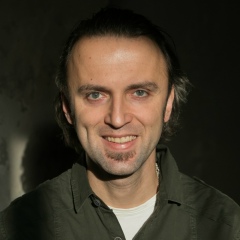Часть 3 Вопрос лидерства
Все это хорошо (или плохо), но что же с лидерами? Сторонник «героической» теории скажет: «Нелепо отрицать их роль» И мы вынуждены согласиться. Отрицать роль лидера, который ведет людей за собой, который в решительный момент делает удачные ходы или ошибки невозможно. И все это кардинально меняет ход событий.
Наиболее логичным кажется следующий ответ, проистекающий из психологии. Лидер(ы) предлагает(ют) новую модель осознания мира. Человеку сложно воспринимать мир вне какой-то системы. Так устроено наше сознание. Чтобы анализировать факты, нам нужна система, рабочая теория и т.д. В ходе событий, описанных выше, теория ранее действовавшая признается несостоятельной. Но как ни упоителен момент полной свободы, вскоре сознание начинает тяготиться беспорядочно летящими в него фактами, которые оно не в состоянии систематизировать.
Именно здесь и приходит на выручку лидер. Он дает новую (или на самом деле старую в той или иной мере очищенную) модель сознания и восприятия фактов. Если эта теория удачна, то переворот(в обществе, в коллективе, в науке) идет удачно, захватывая все новые умы, отсекая различные маргинальные модели. Если же нет, то революция (в обществе, сознании, науке, группе лиц) заходит в тупик и превращается в смуту, либо же старая модель одерживает верх.
Все это хорошо (или плохо), но что же с лидерами? Сторонник «героической» теории скажет: «Нелепо отрицать их роль» И мы вынуждены согласиться. Отрицать роль лидера, который ведет людей за собой, который в решительный момент делает удачные ходы или ошибки невозможно. И все это кардинально меняет ход событий.
Наиболее логичным кажется следующий ответ, проистекающий из психологии. Лидер(ы) предлагает(ют) новую модель осознания мира. Человеку сложно воспринимать мир вне какой-то системы. Так устроено наше сознание. Чтобы анализировать факты, нам нужна система, рабочая теория и т.д. В ходе событий, описанных выше, теория ранее действовавшая признается несостоятельной. Но как ни упоителен момент полной свободы, вскоре сознание начинает тяготиться беспорядочно летящими в него фактами, которые оно не в состоянии систематизировать.
Именно здесь и приходит на выручку лидер. Он дает новую (или на самом деле старую в той или иной мере очищенную) модель сознания и восприятия фактов. Если эта теория удачна, то переворот(в обществе, в коллективе, в науке) идет удачно, захватывая все новые умы, отсекая различные маргинальные модели. Если же нет, то революция (в обществе, сознании, науке, группе лиц) заходит в тупик и превращается в смуту, либо же старая модель одерживает верх.
Part 3 The Leadership Question
All this is good (or bad), but what about the leaders? A proponent of the “heroic” theory will say: “It is ridiculous to deny their role” And we are forced to agree. It is impossible to deny the role of a leader who leads people behind him, who at the decisive moment makes successful moves or mistakes. And all this radically changes the course of events.
The most logical seems to be the following answer, resulting from psychology. The leader (s) offers (s) a new model of awareness of the world. It is difficult for a person to perceive the world outside of any system. This is how our consciousness works. To analyze the facts, we need a system, a working theory, etc. In the course of the events described above, the previously existing theory is recognized as bankrupt. But no matter how delightful the moment of complete freedom is, consciousness soon begins to be burdened by randomly flying facts into it, which it is not able to systematize.
It is here that the leader comes to the rescue. He gives a new (or actually old, to some extent purified) model of consciousness and perception of facts. If this theory is successful, then the coup (in society, in the collective, in science) is successful, capturing more and more new minds, cutting off various marginal models. If not, then the revolution (in society, consciousness, science, a group of people) comes to a standstill and turns into confusion, or the old model prevails.
All this is good (or bad), but what about the leaders? A proponent of the “heroic” theory will say: “It is ridiculous to deny their role” And we are forced to agree. It is impossible to deny the role of a leader who leads people behind him, who at the decisive moment makes successful moves or mistakes. And all this radically changes the course of events.
The most logical seems to be the following answer, resulting from psychology. The leader (s) offers (s) a new model of awareness of the world. It is difficult for a person to perceive the world outside of any system. This is how our consciousness works. To analyze the facts, we need a system, a working theory, etc. In the course of the events described above, the previously existing theory is recognized as bankrupt. But no matter how delightful the moment of complete freedom is, consciousness soon begins to be burdened by randomly flying facts into it, which it is not able to systematize.
It is here that the leader comes to the rescue. He gives a new (or actually old, to some extent purified) model of consciousness and perception of facts. If this theory is successful, then the coup (in society, in the collective, in science) is successful, capturing more and more new minds, cutting off various marginal models. If not, then the revolution (in society, consciousness, science, a group of people) comes to a standstill and turns into confusion, or the old model prevails.

У записи 1 лайков,
0 репостов.
0 репостов.
Эту запись оставил(а) на своей стене Константин Крылов





















